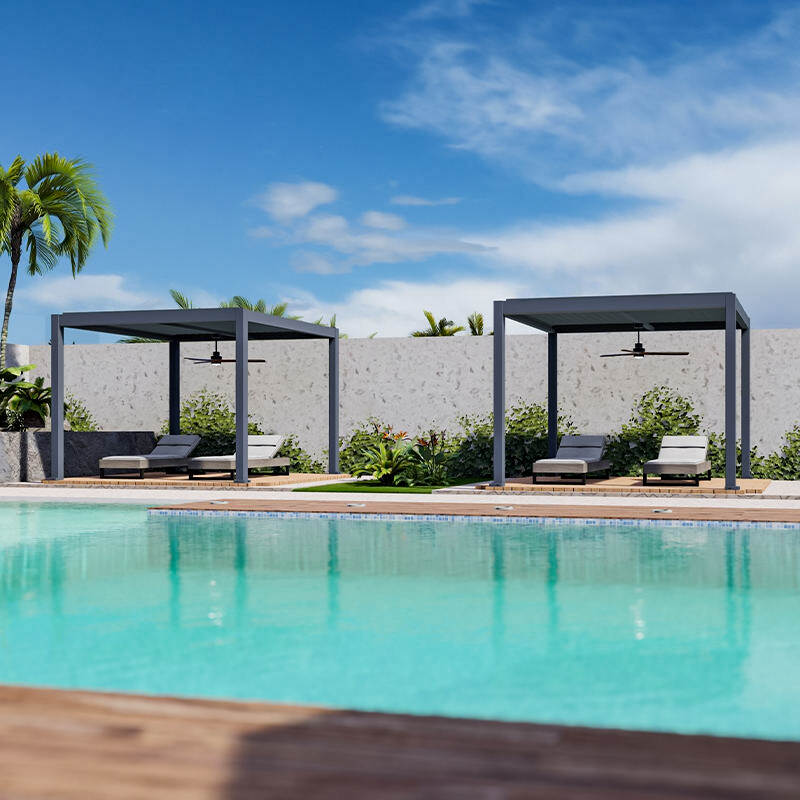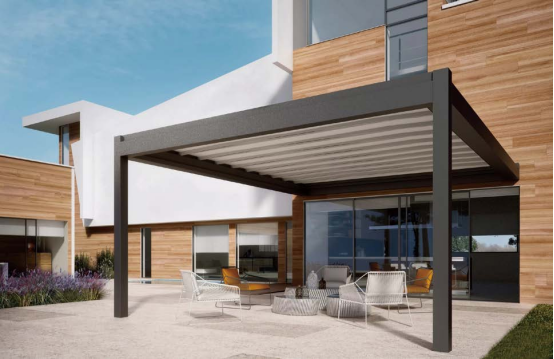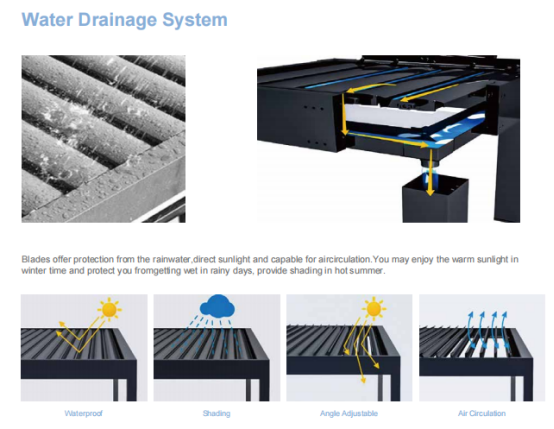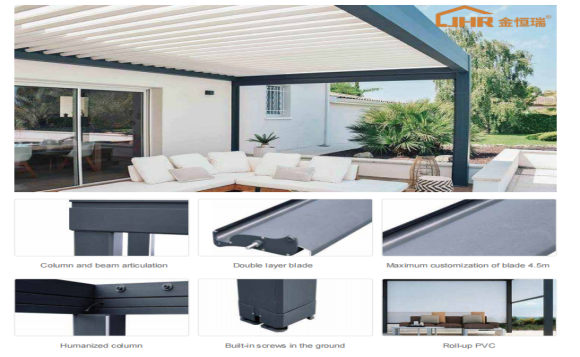

Pergola have become an important part of modern home design. As the perfect transitional space between home and nature, pergola not only increase the natural light inside, but also provide a warm, comfortable living space for family members. With the increasing consumer demand for pergola, aluminum alloy pergola and wooden pergola have become two common choices. Among the many pergola materials, aluminum alloy pergola has gradually become the mainstream choice in the market by virtue of its superior performance and long-term cost-effectiveness.
Today, we will deeply analyze the difference between aluminum alloy pergola and wooden pergola from many aspects, focus on the advantages of aluminum alloy pergola, and help you better understand why choosing aluminum alloy pergola is the ideal choice.

I. Material Comparison
Aluminum alloy pergola: excellent performance and durability
Aluminum alloy, as a modern construction material, is widely used in pergola structures due to its excellent mechanical properties and corrosion resistance. Aluminum alloy pergola is not only lightweight and sturdy, but also has excellent weather resistance and durability, which is suitable for various climatic environments.
Strong corrosion and weather resistance
Aluminum alloy is anodized or painted to provide very strong corrosion resistance, even in wet or rainy environments. In contrast, wood is prone to rotting and swelling in wet environments, and the durability of aluminum alloy pergola far exceeds that of wooden pergola.
Lightweight and High Strength
The strength of aluminum alloy is much higher than similar materials and lighter in weight, which makes the structure of aluminum alloy pergola more stable and does not add extra load, especially suitable for large glass window surface. In contrast, wooden pergola have poor structural load-bearing capacity due to the physical properties of wood, and larger glass windows may require additional support.
Sustainability and environmental friendliness
Aluminum is a recyclable material, which is in line with the modern concept of environmental protection. Although timber itself also possesses environmentally friendly properties, there is a certain amount of resource consumption and environmental impact due to the process of harvesting and treating timber. Therefore, from the perspective of environmental friendliness, aluminum alloy pergola also has certain advantages.

Wooden pergola: natural beauty and unique flavor
Wooden pergola, on the other hand, with their natural, warm appearance and affinity, attract many consumers who love nature and country style. With its natural texture and color, wood creates a warm and inviting atmosphere that is especially suitable for families who prefer a traditional, natural home style.
Natural beauty
The natural grain and color of wood makes each wood pergola unique and has a strong natural look. This natural beauty is especially favored in modern homes, especially those pursuing a rustic, country style.
Good thermal insulation
As a natural material, wood has good thermal insulation properties, which can effectively regulate the indoor temperature and keep you warm in winter and cool in summer. However, wood is also susceptible to changes in environmental humidity and temperature, and may deform or crack in long-term use, requiring regular maintenance.
Second, the design and aesthetics
Aluminum alloy pergola: modernity and simple beauty
With its simple and modern design style, aluminum alloy pergola can seamlessly integrate with various architectural styles. The lightweight frame of aluminum alloy makes the design more simple and maximizes the spaciousness and transparency of the pergola.
Slim frame to maximize light from the glass
Due to the high strength and light weight of the aluminum alloy frame, it is possible to design a slimmer frame, which makes the glass surface of the pergola larger, thus increasing the lighting area and making the whole space brighter and more spacious.
Second:Modern Appearance Design
The appearance of aluminum alloy pergola is usually more in line with modern home design trends, with clean lines and flexible shapes. It not only enhances the overall aesthetics of the house, but also complements modern, industrial, minimalist and other styles of architecture.
Wooden pergola: unique natural flavor and sense of warmth
The design of wooden pergola pays more attention to the atmosphere of nature and warmth. Its texture and color give people a sense of relaxation and tranquility, which is especially suitable for those families who like natural style or retro style.
Close to nature, creating a cozy atmosphere
Wooden pergola bring a fresh, natural air to the interior, and their natural wood grains and warm colors are perfect for creating a cozy, relaxing retreat. However, the tone of the wood may change over time and requires regular maintenance and painting to maintain its appearance.
Ideal for Rustic or Rustic Styles
Wooden pergola are most compatible with natural environments and rustic-style architecture, creating a home space that is in close contact with nature and giving a back-to-nature, laid-back feel.
Third, maintenance and long-term use of the cost
Aluminum alloy pergola: low maintenance, high cost-effective
One of the biggest advantages of aluminum alloy pergola is its low maintenance cost. Aluminum alloy material does not require regular painting or anti corrosion treatment, and daily cleaning can maintain its appearance and function. Even when exposed to natural environments such as sunlight, rain, wind and sand for a long period of time, aluminum alloy pergola are still able to remain in good condition, with a long service life and low maintenance costs.
No need for special maintenance
The corrosion resistance of aluminum alloy makes it virtually unnecessary to paint or replace frame components on a regular basis. Even when used in seaside or wet areas, the frame of the aluminum pergola can remain intact, with almost no risk of rotting or fading.
Long-Term Affordability
Although the initial investment in an aluminum pergola may be slightly higher, it is very cost-effective as it requires little maintenance and repair, and costs relatively little in the long term.
Wooden pergola: Require Regular Maintenance and Repairs
Wooden pergola, despite their beauty, require regular maintenance work. Exposed to the outside environment, wood is susceptible to moisture, pests or rot, and requires regular application of preservatives, painting and cleaning. Regular maintenance not only maintains its appearance and functionality, but also extends the life of your wood pergola.
Regular Inspection and Maintenance
Wooden pergola need to be regularly inspected for cracking, deformation or rotting of the wood, especially in humid environments, where the maintenance of the wood is even more important. In addition, the appearance of wooden pergola may change color over time, requiring regular maintenance work.
Higher long-term maintenance costs
Wooden pergola have relatively high maintenance costs, especially when they require regular maintenance work such as preservation of corrosion, moisture, and painting, all of which add to the long-term cost of use.
Fourth, cost comparison and return on investment
When it comes to pergola investment, aluminum pergolas usually have a low initial investment. Although the initial cost of aluminum alloy pergolas is relatively high, its high structural strength, durability and almost no special maintenance are required, which makes its total cost in long-term use low and has a very high cost performance ratio. In long-term use, aluminum alloy pergola only needs regular cleaning and inspection, almost no need to invest additional large amount of maintenance costs. Therefore, from the perspective of long-term return on investment, aluminum alloy pergola is obviously more advantageous.
In contrast, the initial investment in a wood pergola is usually higher because wood itself is more expensive and requires more labor costs for processing and installation. In addition, wood, as a natural material, is susceptible to weather, moisture, pests, and other factors, and therefore requires regular maintenance such as preservation, pest control treatment, and painting. The cost of these maintenance and upkeep increases with time of use, especially in humid or rainy areas where wood maintenance is more tedious and expensive.

Comprehensive Summary: Why Choose Aluminum pergolas?
Excellent durability and low maintenance cost
Aluminum alloy pergola has excellent weather resistance and corrosion resistance, almost no need for special maintenance, and its long service life, is the choice of high long-term return on investment.
Modern and Simple Design
Aluminum pergolas offer a larger glass surface to maximize natural light, and a cleaner, more modern design that blends seamlessly into a variety of home styles, making them especially suited to the needs of modern families.
Cost-effective
Although the initial cost of aluminum alloy pergola is slightly higher, the long-term maintenance cost is lower and cost-effective, which is suitable for consumers who pay attention to the long-term use value.
Adaptable to various climatic conditions
Aluminum pergolas are able to maintain good performance in a wide range of harsh climatic conditions, making them ideal for use in a variety of climates.
Overall, while wood pergolas may offer some initial aesthetic and uniqueness advantages, the low maintenance costs and outstanding durability of aluminum pergolas make them a more affordable option that can provide a higher return on investment for families in the long run. Aluminum pergolas are undoubtedly the more advantageous choice for consumers who focus on long-term benefits.
Email format error
Email cannot be empty
Email already exists
6-20 characters(letters plus numbers only)
The password is inconsistent
Email format error
Email cannot be empty
Email does not exist
6-20 characters(letters plus numbers only)
The password is inconsistent